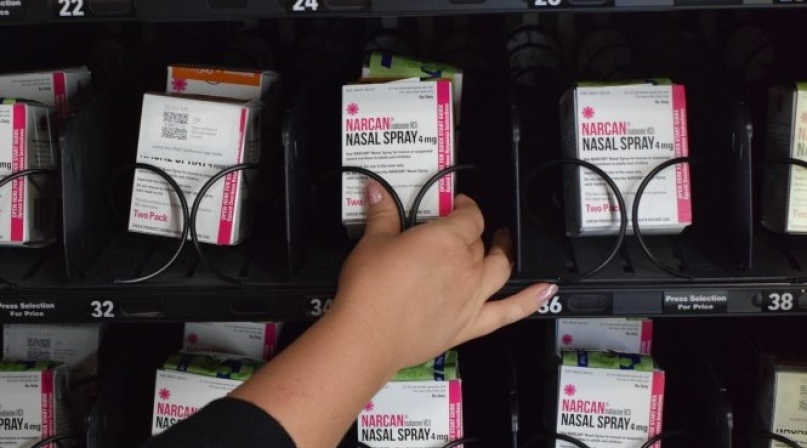Narcan vending machines help deter overdose deaths

Key Takeaways
Vending machines stocked with Narcan are popping up all over the country, increasing access to the overdose-reversing drug and alleviating the stigma of substance use disorder. Through state funding, Wayne State University’s Center for Behavioral Health and Justice (CBHJ), located in Wayne County, Mich., is installing dispensers in 27 counties throughout the state in county jails and organizations that specialize in harm reduction and recovery.
The hope is that providing Narcan in such a convenient way at no cost will encourage all people, whether they personally use substances or not, to carry the life-saving drug. More than 106,000 people died in 2021 from drug-involved overdose deaths, according to the National Institute on Drug Abuse.
The vending machines, which are funded through a grant program the center has with the Michigan Department of Health and Human Services, distributed over 7,075 kits last year, according to CBHJ Program Manager Matthew Costello.
“We understand a primary utilizer of our machines is going to be people who may not be opioid involved at all, but they know of a loved one or a person that they care about who is, and want to be prepared for that,” Costello said. “For somebody who’s not involved, it’s like any other emergency situation — if you come across somebody on the street or in your workplace or something like that, you can then have the opportunity to administer a life-saving antidote medication right away without delay.”
Narcan is available at more than 1,575 pharmacies across Michigan and is covered by Medicaid and other forms of insurance; however, as it becomes more widely available, health economists predict the new price to receive the drug over-the-counter will be between $35 and $65 before the retail markup, as reported in The New York Times.
The center is working with Shaffer Distributing Co., which traditionally sells the vending machines for $3,400 to $11,000, to place the machines. Fifteen machines were installed through the grant in FY 2022 and 20 more will be installed in FY 2023.
“We understand — whether it be the community sites we’re placing them in or the jails — most of them are in budgets that probably would not be robust enough to be able to support the purchase of the Naloxone medication itself,” Costello said. “So, we feel that we’d be very vulnerable should that opportunity to order it through the portal be closed.”
In addition to providing Narcan at no cost, a draw of the vending machine structure is the anonymity it provides, as it doesn’t collect any identifiable information from those who use them.
“I could walk up to any one of our machines right now, hit ‘33,’ a kit drops and I walk away and nobody’s the wiser,” Costello said. “You could go to a participating pharmacy and get a free kit of Narcan, but when we’d have some of our partners do that, they’d go to their doctor and shortly thereafter it would be on their medical record.
“The doctor would be like ‘I see you got a Narcan kit, are opioids a problem?’ So, it created an outcome people weren’t necessarily comfortable with.”
Amanda Wills, an administrative assistant at Live Rite Structured Recovery Resource Center, located in Macomb County, Mich., said that she’s seen “a lot” more people access Narcan through the center’s vending machine than by asking staff for doses since the machine was installed in January. Live Rite is the first location in Macomb County to install a machine through the CBHJ grant, and as of April 1, its dispensed 90 boxes, according to Wills.
“We’re trying to cover as many bases as we can,” Wills said. “We already handed it out in the office, so we thought it would be great to have a machine here, so that way, even when our office isn’t open — like in the evenings for AA and NA meetings — people could still get it after-hours.”
Release vestibules in county jails are a convenient location for the vending machines, because they’re open 24/7 to the public and overdose rates upon release from jail are 129 times higher than that of the general population. According to Costello, around 60 percent of the vending machines installed through the grant are in county jails.
“One thing jails don’t need to be educated on is the depth of the opioid crisis, because they’re living it every day,” Costello said. “Urban jails, rural jails — they’re all getting people coming in and going through very difficult opioid withdrawals, and there’s really not much that was going on to provide services for them, so the sheriff’s offices need to work around that.”
To get the word out about the Narcan dispensers, the Center for Behavioral Health and Justice reached out to county jails it had existing relationships with through medication-assisted treatment, and other organizations were connected through word of mouth, according to Costello.
Ingham County Jail in Michigan unveiled its Narcan vending machine last month.
“I have clearly seen, on calls in the community, this literally brings people back from the dead,” Ingham County Sheriff Scott Wrigglesworth said.
“So, certainly the more we can do that, the less likely people are going to continue down this path, the less likely that they’re going to obviously pass and have this tragedy transcend their families, the less likely we have to go to overdoses, save people’s lives, investigate how they acquired the opiate or whatever they overdosed on.
“… As people who may have substance use disorder are getting released from jail, they may have that urge to use again, so this is just a way that they can put that insurance policy in their pocket if they do choose to use again.
“We hope they don’t, but we know reality is that it happens, so they can have this life-saving reverse agent on them when they get released.”
Narcan vending machines are an important asset in the country’s larger uphill fight in the opioid crisis, Costello said.
“We keep defibrillators in just about every public space that there are out there, why are we not doing these same kinds of things for Naloxone?” Costello said.
“There’s a lot of work left to do, but where we are today versus where I started with the center four years ago — I think we’ve come a long, long way.”
Related News

House Agriculture Committee introduces 2026 Farm Bill
On February 13, House Agriculture Committee Chairman G.T. Thompson (R-Pa.-15) introduced the House version of the 2026 Farm Bill, the Farm, Food, and National Security Act of 2026.

USDA and HHS release new dietary guidelines
On January 7, U.S. Department of Agriculture Secretary Brooke Rollins and U.S. Department of Health and Human Services Secretary Robert F. Kennedy, Jr. unveiled the new Dietary Guidelines for Americans, 2025–2030.
Featured Initiative
NACo Commission on Mental Health and Wellbeing
(2023-2024) Counties increasingly handle direct mental health service. NACo’s Commission on Mental Health and Wellbeing developed reports and united county leaders to address the mental health crisis through key policy priorities.

